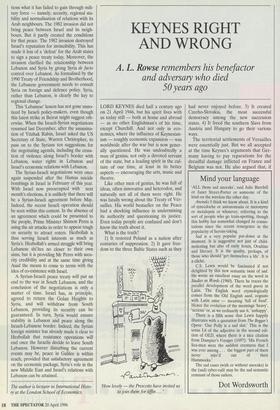Mind your language
`ALL those sad anoraks', said Julie Burchill or Janet Street-Porter or someone of the kind on the wireless the other day.
Anoraks I think we know about. It is a kind of synecdoche or antonomasia or metonymy or metalepsis or whatever, referring to the sort of people who go train-spotting, though this hobby has somewhat changed its conno- tations since the recent resurgence in the popularity of heroin-taking.
Sad is a very popular put-down at the moment. It is suggestive not just of child- molesting but also of early hours, Ovaltine and literacy. It is the quality, perhaps, of those who should 'get themselves a life'. It is a cliché.
C.S. Lewis would be fascinated if not delighted by this new semantic twist of sad. He wrote an excellent essay on the word in Studies in Words (1960). There he traces the parallel development of the word gravis in Latin. The English word etymologically comes from the Old English saed, cognate with Latin satur — meaning 'full of food'. Hence the evolution of the meanings 'heavy', `serious' or, as we ordinarily use it, 'unhappy'.
There is a fifth sense that Lewis happily illustrates with a quotation from The Beggar's Opera: 'Our Polly is a sad slut.' This is the sense 1.6 of the adjective in the second edi- tion of OED, where there is a nice citation from Dampier's Voyages (1697): 'His French Sea-men were the saddest creatures that I was ever among . . . the biggest part of them
never stirr'd out of their Hammocks.'
The sad cases (with or without anoraks) in the (sad) cyber-café may be the sad semantic remnant of those sailors.
Dot Wordsworth


































































 Previous page
Previous page